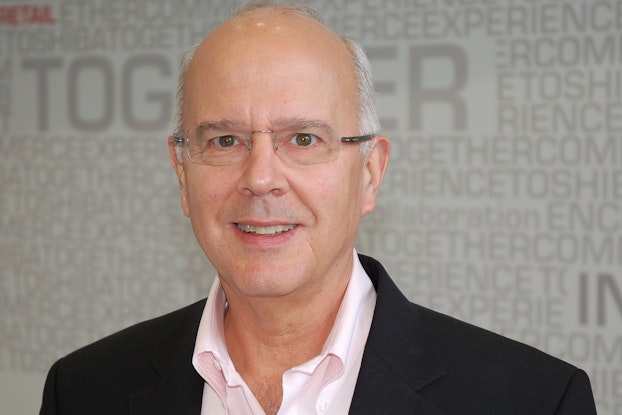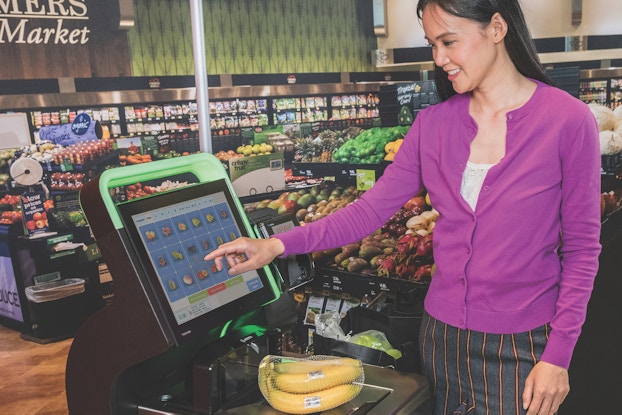
Toshiba’s Steve Fox knows that retail customer expectations are higher than ever.
That's thanks to stores like Amazon Go, where consumers shop in a checkout-free environment patrolled by an army of sensors and cameras — one of the many technological advancements that has raised the bar for retailers seeking to provide a frictionless experience for their customers, said Fox, who in October was named senior vice president of Toshiba Global Commerce Solutions, a technology provider to more than half of the world’s 25 largest retailers.
Agility and the ability to collaborate both internally and externally with other organizations will be key attributes of retail technology providers going forward as commerce spirals rapidly toward a world of seamless, omnichannel experiences, he said.
“There's no longer extended time to introduce new ideas and capabilities,” Fox told CO— shortly after his appointment to the position, where he oversees Toshiba’s professional services, managed services, hardware “break/fix” (a term that encompasses a range of technology services), maintenance, deployment and store-as-a-service initiatives.
A report from Juniper Research projected that retail spending at frictionless payment stores like Amazon Go will grow from about $253 million in 2018 to more than $45 billion by 2023. In addition, the report estimates that 1.4 billion retail transactions will feature “smart” technologies of some sort in 2023.
Fox described the previous strategy for delivering technology solutions to retailers as the “waterfall approach” — a time-consuming process of learning the retailer’s requirements, setting the specifications, developing a solution and then testing it. That process is simply too slow for the demands of today’s retail environment, and companies such as Toshiba must be organized to operate nimbly and collaboratively in this new world, said Fox.
“The whole sequential waterfall approach to the development cycle is a thing of the past — way past,” he said. “We need to have as much ownership and sense of urgency as our clients do.”
Fox had been Toshiba’s vice president of global services before taking on his new role. Before joining Toshiba, he was a partner at 5 Points Consulting and vice president of professional services at eLoyalty.
“Steve is an elite professional and managed services executive with expertise in designing and implementing best-in-class programs that help retailers of all sizes succeed,” said Scott Maccabe, president and chief executive officer, Toshiba Global Commerce Solutions, in a statement. “His appointment is sure to help us deliver more streamlined store operations and associate engagement to our customers.”
As a leading global provider of checkout technologies and other retail solutions, and with a focus entirely on retail, Toshiba sees itself well-positioned to meet retailers’ demands in this environment.

The need for rapid decision-making
In order to serve its retail clients — a term it prefers to “customers” because of the long-term relationship it implies — Toshiba needs to have a structure that supports rapid decision-making, Fox said.
“I'm looking at how we continue to evolve our professional services and our maintenance and managed services to be able to deliver in an agile and a very nimble sort of way,” he said.
That translates into empowerment at the front lines, where employees can make decisions that help Toshiba’s retail clients achieve their desired business outcomes, rather than a bureaucratic environment where decision-making travels “up the chain, across the chain, and back down the chain,” as Fox described it.
Fox said another important mission for Toshiba Global Commerce Solutions going forward will be keeping his organization free of silos, which helps the company present a unified front to its clients.
“We have to be able to deliver in a very collaborative, very integrated way to our clients so that they know that they're dealing with Toshiba and they're going to get a great experience no matter who from the services organization that they're working with,” he said.
He said he doesn’t have specific changes planned for the organization at this time.
“At this point, it's still really seeing what we need to do,” said Fox.
I'm looking at how we continue to evolve our professional services and our maintenance and managed services to be able to deliver in an agile and a very nimble sort of way.Steve Fox, senior vice president, Toshiba Global Commerce Solutions
Technology
Toshiba Global Commerce Solutions is serving many major retailers. Read on for more technology trends that your business can incorporate.

Collaboration is key
In addition to agility and speed to market within the organization, collaboration with other technology providers will be a key component of the business strategy of Toshiba Global Commerce Solutions going forward.
“One of the changes, I think, that’s affecting Toshiba Global Commerce Solutions overall is our being able to intelligently find those partners that can help compliment and bring the best-of-breed, best practice capability to our clients,” said Fox.
Toshiba collaborates with scores of solutions partners, from Zebra Technologies to APG Cash Drawer, to provide retailers with the right combination of tools to meet their business objectives. The company’s ability to weave together solutions from multiple technology suppliers provides a key point of differentiation against competitors, said Fox.
“Sometimes it's a really key differentiator, because some clients have very unique needs that certain competition out of the box can't solve, but we can solve by virtue of having flexibility in how we bring together those different technologies into a really effective self-service solution,” he said.
The need for such a collaborative approach is illustrated by the Amazon Go stores, Fox said, citing the use of cameras, scanners, loyalty data analysis and other technologies that need to work together seamlessly throughout the store in real time. Additionally, technologies such as the internet of things (IoT) and radio frequency identification (RFID) will increasingly play a role in the retail environment as merchants seek to create a frictionless experience, he said, and those technologies, too, will need to work in hand in hand with others.
Related to this multi-technology solution is the growing application of “edge computing,” or computing that is shifted from the cloud (off-site data centers) closer to where the data is actually used.
With edge computing, “you have computing at the point of where that computing and data is needed,” said Fox. “Pushing it back up to the cloud and having it go through whatever machinations that have to happen with that data, then pushing it back down for it to be used, is not effective. Edge computing increases the timeliness and use of that data.”
In-store checkout technologies will also work hand-in-hand with other technologies retailers are expected to deploy in the near future, such as robotics and artificial intelligence, said James Moar, an analyst at Jupiter and the author of the report.
“Many of these technologies can bring multiple benefits to retailers,” he said. “For example, robots and RFID can be used in both customer service and inventory management, making both elements of in-store retail more efficient.”
CO— aims to bring you inspiration from leading respected experts. However, before making any business decision, you should consult a professional who can advise you based on your individual situation.
Want to read more? Be sure to follow us on LinkedIn!
CO—is committed to helping you start, run and grow your small business. Learn more about the benefits of small business membership in the U.S. Chamber of Commerce, here.







